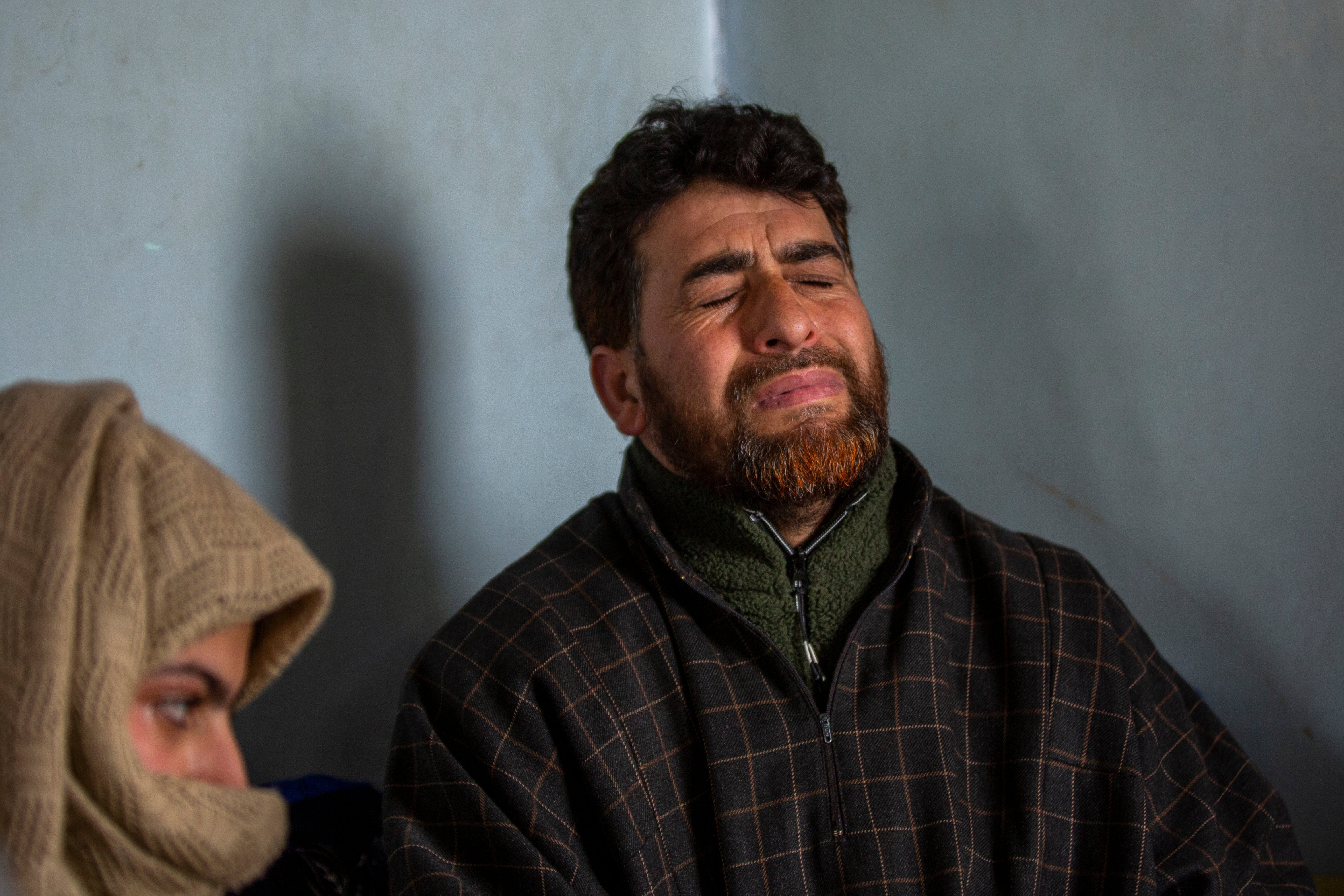Father of slain Kashmiri teen says he has been charged under anti-terror law ‘for demanding son’s body’
The father had accused the army of killing his son in a 'staged encounter'

Your support helps us to tell the story
From reproductive rights to climate change to Big Tech, The Independent is on the ground when the story is developing. Whether it's investigating the financials of Elon Musk's pro-Trump PAC or producing our latest documentary, 'The A Word', which shines a light on the American women fighting for reproductive rights, we know how important it is to parse out the facts from the messaging.
At such a critical moment in US history, we need reporters on the ground. Your donation allows us to keep sending journalists to speak to both sides of the story.
The Independent is trusted by Americans across the entire political spectrum. And unlike many other quality news outlets, we choose not to lock Americans out of our reporting and analysis with paywalls. We believe quality journalism should be available to everyone, paid for by those who can afford it.
Your support makes all the difference.The father of a teenage boy, who was killed allegedly in an encounter by the army, has been charged with a stringent anti-terror law by police in the federal Indian territory of Jammu and Kashmir, even as the family insisted that the minor was innocent and demanded that his body be returned.
Mushtaq Ahmed Wani and six others, including his two brothers, have been charged under the Unlawful Activities (Prevention) Act (UAPA) for “organising illegal processions, abetted anti-national elements and spreading disaffection against the state”, reported Associated Press.
Mr Wani, 42, from Bellow village in Pulwama, is the father of 16-year-old Ather Mushtaq, who was shot dead along with two others on 30 December during what police claimed was an encounter with terrorists on the outskirts of the main city of Srinagar.
Speaking to The Independent on Tuesday, Mr Wani said he is being charged for demanding the body of his son.
“Is that a crime?” asked Mr Wani. “We are humans, we have emotions. Why can’t I get the basic right demanding my son’s body back,” he said.
Mr Wani had held a rally on 5 February and raised slogans after Friday’s prayer near a village mosque in presence of senior police officials.
“It was a peaceful gathering and we pressed our demand in front of the officials thinking they would listen to us. We dispersed from there just in five to ten minutes and later I was informed that mosque’s cleric has been detained,” he said.
He said he got the information that he was being charged under UAPA from his neighbours after some of them were summoned for questioning by police.
“They want to silence me, intimidate me. They should prove the wrongdoing of my son and then arrest me,” said Mr Wani, adding that he would fight legally if jailed.
While the army called those killed in the encounter “hardcore associates of terrorists”, the family opposed the claim.
The Independent had spoken to the families of the three men and the families contradicted the Indian army’s claim that their sons were terrorists. They had demanded an investigation into the encounter, calling it a “staged killing.”
Mr Wani said he has kept a fresh grave ready near his home where he wants to rest his son.
Hundreds of civilians and militants have been killed in Jammu and Kashmir in “counter-terrorism” operations by the Indian army which blame Pakistan for radicalising youths.
Mr Wani had been holding small protests in his area as well as in Srinagar city ever since the death of his son, demanding that the army return his body so he could give him a proper burial.
The three men killed in the alleged encounter were buried in a remote graveyard about 115 km (70 miles) from their ancestral villages. The authorities have buried over 150 alleged Kashmiri militants in unmarked graves, in a bid to thwart large-scale public funerals and protests.
The police document said on 5 February the Rajpora police station got the information that a “violent mob” congregated outside a mosque, reported Al Jazeera.
“The mob was led by seven people to obstruct the main road and were raising anti-national slogans against the integrity of the nation,” said the document. “The said persons are organising such illegal processions under criminal conspiracy and are abetting anti-national elements.”
Mr Wani and six others have been charged under UAPA, the law amended under prime minister Narendra Modi's government in 2019, allowing police to detain a person for six months without producing any evidence. An accused charged under UAPA can be jailed for up to seven years. The law has been termed “draconian” by rights groups.
The encounter came days after Indian army indicted its officer for the extrajudicial killing of three Kashmiri labourers and acknowledged that they were killed in a staged gunfight in July, 2020.
Kashmir has been riddled with a long-running dispute between India and Pakistan who have fought two wars in the region. Militants have been fighting against Indian rule since the early 1990s. In 2020, the army said it killed 225 terrorists as compared to 152 in 2019.



Join our commenting forum
Join thought-provoking conversations, follow other Independent readers and see their replies
Comments